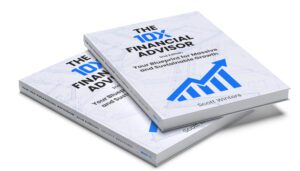When my son was little, he once insisted on filling up his kiddie pool by carrying water in a cracked plastic bucket. I watched him run back and forth from the spigot, sweating, determined, and utterly confused as to why the pool never seemed to get full. After about 20 trips, he plopped down on the grass, defeated, and asked, “Dad, is the water just…disappearing?”
I showed him the small crack in the side of the bucket, where water leaked with every step he took. He looked at me like I’d just revealed the ending of an Avengers movie. “So I could’ve been filling this the whole time if I had the right bucket?” Exactly.
That’s the advisory business in a nutshell. Advisors pour time, energy, and resources into growth, but if inefficiencies are leaking value—through tax drag, manual processes, or sloppy systems—the pool never fills. Clients don’t see the progress they should, margins compress, and both sides of the relationship lose.
And here’s the kicker: most of the leaks aren’t dramatic. They’re quiet. Insidious. A basis point lost here, a delay in communication there, a missed tax strategy hiding in plain sight. Over time, those drips compound into real losses—for the client and the practice.
Morningstar has shown that taxes reduce returns more than either market swings or advisory fees. Yet many portfolios are managed with little regard for tax location or withdrawal strategy. At the same time, advisors are trying to MacGyver their practice with five different tech systems that don’t talk to each other, endless manual workarounds, and workflows that live in someone’s head instead of in a CRM. It’s like running an NFL team with a Pop Warner playbook—it might function, but it’s not winning any championships.
Meanwhile, clients feel the friction. A delayed report, a clunky onboarding process, or an inconsistent service experience can quietly erode trust. And buyers—whether it’s private equity or aggregators—notice too. Inefficient firms aren’t valued as growth engines; they’re valued as fixer-uppers. And nobody pays top dollar for a leaky bucket.
The solution is deceptively simple: fix the leaks. Build efficiency into the DNA of your firm. Streamline operations. Optimize for after-tax returns. Use systems that actually talk to each other. Outsource the work that isn’t your core genius—whether that’s tax, estate, or specialized planning. When you focus relentlessly on efficiency, you create what I like to call the efficiency dividend—a compounding gain that benefits clients in the form of higher net returns and benefits you in the form of higher margins, greater scalability, and ultimately, a higher practice valuation.
Think about it:
- Integrated tech platforms eliminate redundancy, reduce errors, and free up time for actual strategy.
- Documented workflows create consistency, which builds client confidence and loyalty.
- Outsourcing specialized tasks gives you access to expertise without carrying full-time overhead.
- Prioritizing after-tax wealth means clients actually feel the value you provide, because they see what they keep, not just what they earn.
Here’s the part most advisors miss: efficiency isn’t just an internal win. It’s a client story. When you can quantify the tax saved, the time preserved, the errors avoided—that’s not overhead, that’s ROI. It reframes your fee from a cost to an investment, one that pays a return every single year.
Or to put it back in the terms of my son’s kiddie pool: once he finally swapped the cracked bucket for one that held water, the pool filled in no time. He spent the afternoon splashing, laughing, and enjoying the reward of a job done efficiently. The right bucket didn’t just save him effort—it gave him back the joy of actually using the pool.
That’s what efficiency does for your practice. It plugs the leaks, fills the pool, and lets both you and your clients enjoy the compounding rewards.
The market will do what it does—sometimes up, sometimes down, always unpredictable. But efficiency? That’s the lever you can control. And when you pull it consistently, it creates one of the most durable, compounding sources of value in our business.
So ask yourself: are you carrying water in a cracked bucket, or have you built the systems to make sure every drop counts? Your clients—and your future valuation—are waiting for the answer.
The lesson here isn’t just about patching leaks — it’s about transforming how you think about growth itself. Efficiency isn’t a back-office upgrade or a tech project; it’s a strategic multiplier that compounds value across every part of your business. When you design systems that capture every drop — from tax optimization to seamless workflows to smart outsourcing — you’re not just saving time or trimming costs. You’re building a practice that scales without friction, delivers visible ROI to clients, and commands a premium valuation in the marketplace.
The advisors who win in the next decade won’t necessarily have the biggest teams or the flashiest branding — they’ll be the ones who master operational leverage. The question is: are you ready to turn efficiency into your most reliable growth engine?




















